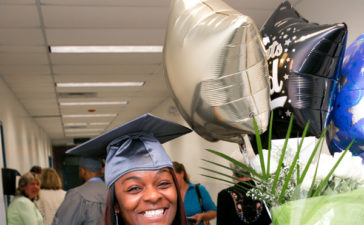“I’m trying to get more into activism. Growing up in the area that I did, it was extremely racist, and there were literally like ten people in my school who weren’t white. I got made fun of and called a lot of names, and then I would also see special needs kids being made fun of, and I would be made fun of for being nice to them. And then, you know, there’s so much hatred towards trans and gay people. I just know what it’s like to be discriminated against for something you have no control over. So, you just try to help others. I’ve always wanted to make it a little easier for others because I know what it’s like. It’s just wrong, and if you can do something about it, then why wouldn’t you? Especially with everything going on, with the Black Lives Matter movement and other things, what gives me the right to just sit here when there are people who are getting killed or going to jail for just using their right to protest? Even here, there have been times when I’ve gotten to speak about it in class. I’ve had some good professors who I really loved and who gave me the opportunity to share my opinion. Not everyone agrees with it. But I’m just like, ‘Racism still exists. Have you looked at the news? Have you seen the people dying? There’s a history in America. It was built on slavery, from Native Americans and then Africans. America is based on slavery.’ And I know from experience because I didn’t know anything about it. My dad’s girlfriend was white, my dad is Puerto Rican, my mom is black. I didn’t know anything about racism until I went to school and started getting called the ‘n’ word. And I was like ‘What’s that? It sounds like a bad word, Dad, so I don’t know if I can say it.’ That’s when I found out that racism exists, and those kids at school were just being racists. But I don’t get mad about people not thinking it exists because if you don’t have to deal with it, then I think it’s harder to understand, if you don’t see it or have to deal with it yourself. That’s why educating people and talking about it is so necessary, to get it out there so that other people can see that these things are still going on. And maybe that will cause people to question their own choices or beliefs and the way they talk, so that they aren’t just oblivious to racism. Everyone should have the same rights, and it doesn’t matter who you are or how you live. You should still be treated as a person.”
Stories of SUNY Ulster — Zanneya

Leave a reply













